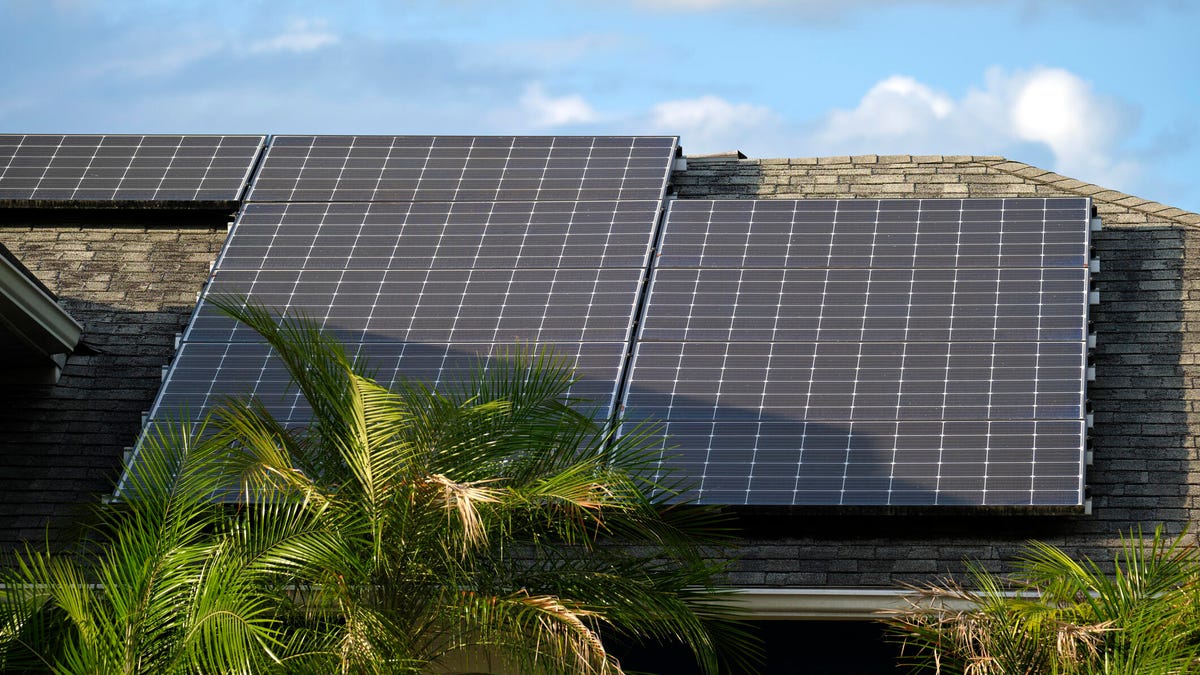
There’s more than a little weirdness on the financing side of solar panels right now.
Deciding to go solar can be complicated enough before you start contending with door-to-door salespeople and confusing financing offers. So how do you make sure you’re getting a good deal or, more to the point, not getting scammed?
There are a few common red flags you can look out for when you’re talking about financing with a solar company, according to experts. Understanding how loans and leases should work, and how they shouldn’t, is key to protecting yourself from financial headaches down the road.
Here’s your guide navigating the financing part of the solar equation.
Why you need to be careful about paying for solar panels
Unfortunately, there are some bad actors in the solar industry right now. With a huge influx of federal money and incentives, some companies are trying to cash in by taking advantage of customers.
If you’re not careful, you might end up with a monthly payment that escalates rapidly after an introductory period, or you might end up paying more for energy than you did before you installed solar panels. And with decades-long lease or loan terms, that’s no small thing.
“Twenty-five years, it’s a long time to pay the price,” said Robin Saidov, owner of Your Energy Footprint, an education platform for homeowners.
But it doesn’t have to be this way: You can learn how to avoid nightmare scenarios.
Financial red flags when it comes to solar panels
Here are some warning signs that a solar financing deal might not be in your best interest.
You haven’t seen a copy of the contract
This is surprisingly common. Andrew Milz, a trial attorney at Flitter Milz focused on consumer finance fraud, said he hears frequently from solar customers who never got the chance to review a solar financing contract before signing or whose signatures were forged without their knowledge.
“The most troublesome, from my perspective, are these claims of forgery or fraud,” Milz said.
It can be easy for these things to happen when a solar salesperson is seated at your dining room table, quickly tapping through terms on an iPad. But Milz said customers are entitled to see a contract and take the time to review it.
This ensures that you can read all the fine print, understand the payments you’ll be on the hook for, and avoid any financial surprises later.
You’re being promised state or federal incentives you don’t qualify for
There are a lot of federal and state-level financial incentives for solar panels right now, promising thousands of dollars off the price of a solar system.
But homeowners are eligible for those only if they’re buying (i.e. owning) the panels. “That’s something that’s confusing to the average consumer,” Milz said. If you’re leasing or getting panels through a power-purchase agreement, you won’t benefit from the incentives, so be wary of any solar installer who tells you otherwise.
There’s an arbitration clause in the loan or lease agreement
Many solar financing or lease contracts contain something called an “arbitration clause,” according to Milz. When you sign this, you as the customer essentially give up your right to go to court in the event that the solar company rips you off. Any claims you make will instead be subject to a private “arbitration” system that usually benefits the solar company, Milz said.
It may not always be possible to avoid having this in your contract, but you should at least be aware of what you’re getting yourself into. (Another reason to take your time reading the fine print.)
There’s a ‘teaser rate’ that expires quickly
This is a common tactic for solar companies to attract customers: Promising low upfront payments that increase, sometimes drastically, over time.
In some cases, the installer is assuming you’ll receive a chunk of money from a government incentive and put that toward the payment of your panels, otherwise the monthly payments will jack up. “Folks are often caught off guard by that,” Milz said.
Escalator clauses, which gradually increase your payment by a small percentage each year, are quite common, but again you’ll want to be aware of what you’re getting into. Saidov said installers usually justify that increase by saying it’s comparatively lower than the increase in electricity rates from the utility, but that isn’t always the case. The escalator “could be much higher than your utility rate is actually increasing,” she said.
How to get a good deal when getting solar panels
There’s a lot of advice on how to avoid these traps and get a good deal on solar. But generally speaking, you want to treat this like any other major transaction. Consider multiple options and installers, shop around and work with people who you trust.
“Slow the process down. Demand to see the contract in advance. Demand a paper copy if you can get one,” Milz said. “Don’t be rushed through the transaction.”
If you’re unsure about any contract terms, it’s not a bad idea to consult a lawyer, Milz said.
Saidov also urges customers to consider alternative financing options. You don’t have to finance the solar panels through the installation company. Your trusted local bank might offer solar loans, or you could avoid financing schemes all together and ask for a cash price, she advises.
“If you pay for the system in cash, you’re going to be making a better financial choice,” Saidov said.

